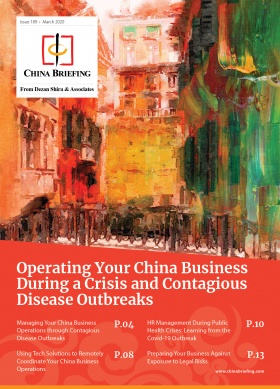How to Enter China’s Online Gaming Market
With hundreds of millions of people in China stuck inside their homes amid lockdown measures to combat the coronavirus, video games reached unprecedented levels of popularity in recent months.
The popular Chinese game Honor of Kings, for example, had over 60 million streams on the streaming platform Douyu over Chinese New Year, compared to just over 30 million the year before. Similarly, the Chinese tech giant Tencent experienced a sharp decline in the use of services like WeChat Pay during the outbreak, but its gaming services grew at the same time.
Regardless of video games’ heightened popularity during the lockdown, the gaming industry was already thriving in China and poised for continued growth.
China recorded over US$36.5 billion in gaming revenue in 2019, putting it just behind the US as the world’s largest gaming market. Prior to the coronavirus outbreak, the market research firm Newzoo projected that China would recapture its position as the world’s largest gaming market in 2020.
While China’s online gaming market is already enormous and continues to grow, it is subject to a complicated and continually changing regulatory landscape. Here, we look at recent regulatory developments and discuss the most viable market entry strategy for foreign investors.
What are key market entry considerations?
China’s gaming industry is subject to strict oversight and rules that change relatively frequently. Beginning in 2018, Chinese policymakers introduced a number of reforms to the industry that altered the regulatory framework.
Licensing
In order for an online game to become available to the Chinese market, regulators must approve the game’s content and issue it an individualized license.
Games that are deemed to have inappropriate content, such as too much violence or sexual innuendo, will be denied a license. For instance, in 2018 Chinese regulators banned the sale of the popular game “Monster Hunter: World” because they deemed it to have too much violent content.
In March 2018, Chinese regulators introduced a licensing freeze on monetizing online games when the responsibility for licensing was shifted from the State Administration of Radio, Film and Television (SARFT) and the Ministry of Culture – to the Central Propaganda Department.
The freeze, which lasted until December 2018, resulted in the industry’s slowest growth in over a decade, as the market grew by just five percent that year.
It appears that licensing has gotten more selective since falling under the jurisdiction of the Central Propaganda Department.
Prior to the freeze of March to December 2018, regulators approved an average of 641 games per month, while in 2019 they approved just 131 games per month despite a backlog that accumulated during the freeze. Moreover, out of the 1,570 games that were approved in 2019, only 185 were from foreign publishers.
Update: It has been reported in Chinese media that the National Press and Publication Administration (NPPA) is set to begin approving licenses for online video games over the next few weeks after a four-month suspension in 2021. The NPPA has not released its list of newly licensed games since July 22, 2021. One of the reasons for the slowdown in granting approvals is the government’s efforts at tackling gaming addition among minors, and why new compliance measures were recently introduced for gaming companies in China.
How to get listed on Chinese app stores
Starting July 2020, all online games will require an International Standard Book Number (ISBN) in order to be listed on Chinese app stores.
An ISBN is a 13-digit code used to identify a product, most commonly books.
The ISBN application in China involves several government bureaucracies, including the Ministry of Industry and Information Technology (MIIT), the Copyright Protection Center of China (CPCC), and the SARFT, among others.
Previously, only games with certain monetization models required an ISBN.
New rules for oversight
In addition to reforming the licensing system, in recent years authorities have introduced measures designed to limit the amount of time children spend playing video games.
In 2018, the Ministry of Education released policy plans to introduce age restrictions and playing time limits for video games, suggesting that video game addiction caused myopia and poor health.
Later, in 2019, the General Administration of Press and Publication (GAPP) issued rules requiring real-name registration for online gaming, a curfew for online gamers under the age of 18, and spending limits.
The measures ban users under the age of 18 from playing online games between 10 pm and 8 am, and limit them to 1.5 hours of online play on weekdays and three hours on weekends and public holidays.
Further, the measures limit users from eight to 16 years old to adding RMB 200 (US$28.33) per month into their accounts, and RMB 400 (US$56.67) for users between 16 and 18 years old. (US$1=RMB 7.06).
What is the ideal entry model for foreign investors?
Cooperation with Chinese entities is an unavoidable reality for foreign investors entering China’s online gaming market in a formal capacity.
That being said, foreign developers may earn some sales in China while using foreign servers, such as via overseas versions of the popular gaming platform Steam. If a developer hosts exclusively on foreign servers, they do not need to establish a formal presence, like a wholly foreign-owned enterprise (WFOE), nor do they need to acquire an ISBN or license within China.
However, foreign servers are generally only accessible through the use of VPNs, which the majority of Chinese users do not use. Because most Chinese gamers use domestic platforms and app stores, like the Chinese Apple Store or Tencent’s app store, they will not be able to easily find or purchase a game hosted on a foreign server.
Moreover, Chinese users may not be able to use foreign payment methods on foreign platforms, as digital payment systems like Alipay and WeChat Pay are commonly used in China instead of international credit cards. Further complicating payment is that transactions would be charged in a foreign currency – likely US dollars – rather than RMB.
Formally entering the Chinese market, however, poses challenges. Namely, foreign developers need to find a Chinese partner to register and publish their games on their behalf, because foreign-invested enterprises (FIEs) are prohibited from directly publishing games and acquiring ISBNs.
The Japanese gaming company Nintendo, for example, distributes its games through a partnership with the Chinese tech and gaming giant Tencent. Another game that is distributed by Tencent is PlayerUnknown’s Battlegrounds, which is an online multiplayer battle royale game developed and published by PUBG Corporation, a subsidiary of South Korean video game company Bluehole.
In 2019, after a year of waiting for regulatory approvals to monetize the mobile version of PUBG, Tencent opted to model a patriotic version called ‘Game for Peace‘, which was subsequently approved. This was likely due to China’s new regulations calling for the removal of games or refusal to license games that showed too much blood and gore. In the Game for Peace, for instance, characters do not die but rather fall down and after a brief moment get back up and wave goodbye.
Foreign game developers looking to enter the Chinese market may still benefit from establishing a WFOE if they envision long-term engagement with the country. A WFOE allows foreign developers to employ staff, collect payments, and conduct marketing, among other activities. Nevertheless, the key concern for foreign developers entering China is to find a reliable domestic partner to register and promote their games.
Despite the hurdles to enter China’s gaming market, it remains a top destination for foreign game developers due to its enormous size.
Given the continually changing – and sometimes unclear – nature of China’s gaming regulations, foreign investors already operating within the market are also advised to periodically conduct reviews of their structures and compliance thresholds, and ensure they are up to date with the latest regulatory requirements.
Our firm has specific experience in this industry in China and has professionals who can assist and know the regulatory and licensing territory. Contact us at china@dezshira.com.
About Us
China Briefing is written and produced by Dezan Shira & Associates. The practice assists foreign investors into China and has done since 1992 through offices in Beijing, Tianjin, Dalian, Qingdao, Shanghai, Hangzhou, Ningbo, Suzhou, Guangzhou, Dongguan, Zhongshan, Shenzhen, and Hong Kong. Please contact the firm for assistance in China at china@dezshira.com.
We also maintain offices assisting foreign investors in Vietnam, Indonesia, Singapore, The Philippines, Malaysia, and Thailand in addition to our practices in India and Russia and our trade research facilities along the Belt & Road Initiative.
- Previous Article New Cross-Border E-Commerce Zones, Extended Tax Incentives for Small Businesses in China
- Next Article Hong Kong Unveils Anti-Epidemic Fund 2.0: Support for Businesses, Job Retention



























